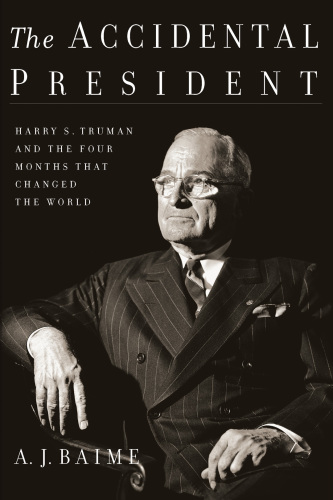
The Accidental President
Harry S. Truman and the Four Months That Changed the World
کتاب های مرتبط
- اطلاعات
- نقد و بررسی
- دیدگاه کاربران
نقد و بررسی

May 15, 2017
New York Times best-selling author Baime chronicles the first few months in office of the man no one had anticipated becoming president. In those months, Truman dealt with the founding of the United Nations, the Potsdam Conference, the Manhattan Project, the German surrender, the liberation of concentration camps, the decision to drop the bomb, and the end of World War II. With a five-city tour.
Copyright 2017 Library Journal, LLC Used with permission.

August 28, 2017
Journalist and editor Baime (The Arsenal of Democracy) carves out a slice of the Truman presidency and serves up an attractive tale for fans of both presidential and WWII history. He opens with an acknowledgement of Truman’s divisive legacy, then sidesteps the debate by arguing that, whether the Missourian is considered among one of the best or the worst presidents, “the first four months of his administration should rank as the most challenging and action-packed” of any president’s. When F.D.R. decided to run for an unprecedented fourth term, he selected Truman, a senator from Missouri whom he barely knew, as his vice president. The position didn’t afford Truman access to Roosevelt’s inner circle and, after F.D.R.’s death, Truman found himself unprepared for the presidency. He proved a quick study, however, and Baime’s account centers on how Truman brought the U.S. through the end of WWII. He writes admiringly of Truman’s negotiations with Winston Churchill and Joseph Stalin over the future of postwar Europe and of his decision to use an atomic bomb on Japan to end the war in the Pacific. Baime opens a clear, if narrow, window on a pivotal moment in history. Illus. Agent: Scott Waxman, Waxman Leavell Literary.

August 1, 2017
A man unprepared for the presidency faces dire challenges.On April 12, 1945, when Franklin Roosevelt suddenly died, Harry Truman (1884-1972) ascended to the presidency. By his own estimation, he was the wrong man at the wrong time. "I'm not big enough for this job," he remarked to a Vermont senator soon after being sworn in. Many in the U.S. echoed his concern: "The gravest question mark in every American heart is about Truman," a senator from Michigan wrote. "Can he swing the job?" Drawing on letters, memoirs, and published sources, journalist Baime (The Arsenal of Democracy: FDR, Detroit, and an Epic Quest to Arm an America at War, 2014), a regular contributor to the Wall Street Journal and other publications, offers a fast-paced, well-detailed chronology of Truman's transformation from an official with little administrative responsibility into a politically astute and ultimately beloved leader. After giving a standard overview of Truman's biography in the first third of the book, the author follows the new president's day-to-day--and sometimes hour-by-hour--schedule as he confronted the challenges of a nation embroiled in war. Just weeks after he took office, Germany surrendered. It was Truman's 61st birthday, and although he felt relieved, he knew, as he announced to the press, "our victory is but half-won." The Allies still faced "the treacherous tyranny of the Japanese," and Truman received conflicting advice about how to surmount that threat. Just days before Germany fell, he had learned, for the first time, about the development of the atomic bomb, a weapon that he believed could force Japan's unconditional surrender. As weeks turned into months, his colleagues "singled out a curious trait about Truman": his firm decisiveness. "You could go into Truman's office with a question and come out with a decision more swiftly than any man I have ever known," his Soviet ambassador said. As Baime shows, that decisiveness came into play at his meeting with Churchill and Stalin at Potsdam and in his go-ahead to obliterate Hiroshima. A warmly human portrait of an unlikely president.
COPYRIGHT(2017) Kirkus Reviews, ALL RIGHTS RESERVED.

























دیدگاه کاربران